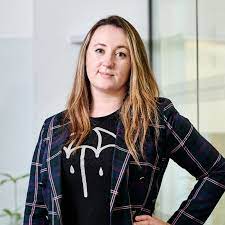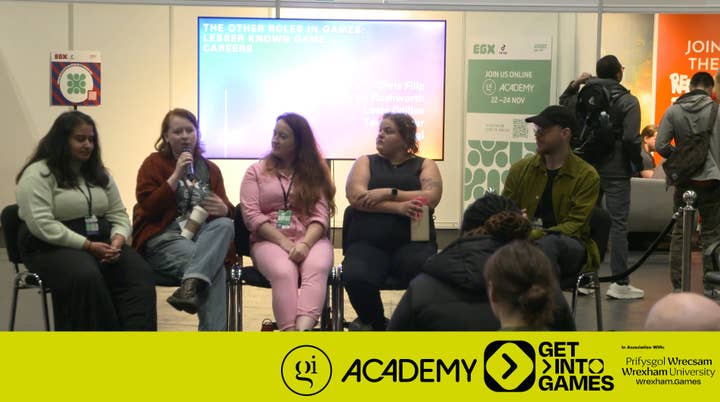How to get into games without making games
From marketing to funding and community management, there's many roles and careers alongside direct development positions
This article is part of our Get into Games special, offering students insight on life in the games industry and advice on how to get into the business. You can also find aselection of the best Academy guides for job-seekers here
When thinking about the games industry, we naturally think about the people and companies making the games, and so assume it's an industry only for those with hard technical skills. But as a £7.05 billion industry in the UK alone (based on the UK Consumer Games Market Valuation in 2022), there's many moving parts that make up the industry that don't involve core game development.
For people interested in getting into games but worried that they lack the technical skills, there are just as many roles – more importantly, paid ones – that are still creative and could be a good fit. A panel at EGX 2023 gathered individuals from a range of roles, and while some are from organisations that are linked to other sectors, their day-to-day is very much part of the games industry.
What are some non-technical roles in games?
So if you want a career in games that doesn't involve making a game, just what kind of roles are there? From our panellist's backgrounds, these can include helping provide funding to game companies, marketing and PR for games, as well as creating a community that gets other people interested in games or a career in games.
- Funding games
Creating games, especially if you're putting together a team or needs years of research and development, requires money. There are many organisations that help provide funding.

Chris Filip is an international business development fund manager for the British Film Institute's UK Global Screen Fund, which provides funding across screen, including film and television, as well as games.
"My day-to-day involves a lot about reading applications, being able to understand what people mean and see opportunities, and that involves a lot of reading about the industry, knowing the direction in which it's going," he said.
Similarly, Nicole Stewart Rushworth's role as a marketing director at Digital Catapult, an innovation agency for advanced digital technology, also involves helping companies get projects funded, some which include VR and AR but also other emergent technologies.
"From the moment I tried on a VR headset, I fell in love with the medium," she said. "Since then I've been very fortunate to try a lot of prototype things and get people in a room together to go, 'What can we do with this? How can we show this off?' Because a lot of our job is showing it to people who will then give us money to go make more things or enable everyone else to make more things."
- Games PR
Just as important as making a game is ensuring there's an audience who wants to play it, which makes games PR essential in getting the word out. That's not just running ads or getting the attention of press and influencers but also building positive communities.

As campaign director at agency Yrs Truly, Ella Hagi's role incorporates a multitude of things that can be creative, such as thinking up and designing campaigns, which varies from client to client.
"I am researching content creators and finding TikTokers to make some videos, other times I'm creating creative briefs for them, sometimes we're doing an event, maybe I'm interviewing a director for a video," she said. "But emails are the one constant in my life. My days might vary, but they start the same way: I sit down, I tidy up my inbox, I make a to-do list and then I build my day around whatever my priorities are."
- Community management
While community management is typically associated with developers engaging with their player community, this is just as important for the business side.
Hub175 is an inclusive inter-university community network for students and alumni, which has its focus on helping people get into games careers through social events.
"I wanted to create a community in London and the games industry was a beautiful fit because [it's] all about community, it's all about bringing people together to have fun," said founder and CEO Tanya Kapur. "It's giving students, grads, anyone really, the place to explore their creative interests and passions."
For indie developers, game development can be isolating, so spaces like The Pixel Mill, a co-working space funded by Northern Ireland Screen, are a valuable environment for local developers to meet, collaborate, and learn from each other. As programme producer, Leela Collins helps support this community with different activities, including running workshops or assisting with funding.
What skills do you need in non-development roles?
Although the above roles can vary greatly in their day-to-day and responsibilities, there are nonetheless some commonalities in that soft skills are highly important. This includes communication, interpersonal, and time management skills.
Being organised is especially important if your role requires wearing many hats on any given day, working with different clients, and especially staying on top of your email inbox, the latter being something all of the panellists have in common.

"Communication is the most important skill for me personally, because it ties into so much," said Collins. "It's part of my networking, building up and knowing as many people as possible, being able to communicate with different types of people, being able to build trust and credibility with indie studios I work with, but also the people with all the money."
Hagi added: "When you work in the games industry, you are going to get some people who will sneer at soft skills and say technical skills are super valuable, but you need people with soft skills around those hard technical skills to make the process smooth. That's kind of the beauty of supporting roles. We can swoop in with our weird random experiences and help facilitate the making of games."
Working with a lot of people who provide funding to projects, Rushworth added that expectation management is also important for her role.
"It's about making those connections and being able to push back and say no, especially when we've got clients knocking on our door. Being really confident in being able to say no to people comes with time and practice."
But even with soft skills, there is still some more expertise required to produce results. For instance, when reading applications for funding, Filip explained that includes understanding business and financial fundamentals, as well as being able to do some basic arithmetic or read Excel spreadsheets.
Communication is also not just about being able to talk to people but making sure you're understood, and tools can be the most effective way to do that. Having worked in game development previously, Filip said, "It's worth being able to communicate your ideas via Excel or PowerPoint to an audience you want to bind to your idea. It's something that I still use day to day, trying to get people to understand my point of view."
Advice for getting into support roles
While these roles do not directly involve making games, Kapur still recommended learning about game development through game jams, which Hub175 also runs for its community, designed for people who have little or no skill or experience making games.
"I think it teaches you a lot about the process as a whole, you start to think about things in a more methodical but different manner while still being able to apply your creativity to it," she explained. "It's also quite important for teaching soft skills, in terms of teamwork and project management."
Hub175's jams also focuses on talks and mentoring from participating speakers, making it even more of a great way to learn, alongside the skills you will inevitably pick from taking part.

"If you're ever doing a game jam, talk to the other jammers," added Filip. "That's part of the purpose of a jam, not just heads down working on games, but making connections."
It might seem difficult to figure out how to find out about these opportunities, but then that's how Collins has been able to grow in their own role: by reaching out, going to events, and networking, which can in turn inspire other opportunities.
"I wanted to show my community that I love workshops, so I started doing a coffee morning online on Discord," they explained. "I think that helped build up so much credibility, to communicate and learn more about what the industry was needing."
They went on to run workshops for NI Screen and organise an unconference, which encourages participants to ask questions and have a try at public speaking.
"Networking is not about finding people who can just help you, it's about building relationships and learning from each other, and supporting each other," they added.
While Hagi agreed with that sentiment, she however advised people reaching out to others in the industry to do so with purpose.
"There's nothing worse than when someone asks you for your time and you give them 30 minutes of your day, and then they don't really know what they want," she concluded. "So do approach people and ask them for advice, but know what it is that you're after."
This article is part of our Get into Games special. You can find more talks and panels via the video links here, and a selection of the best Academy guides for job-seekers here.

